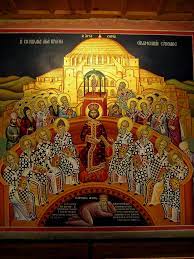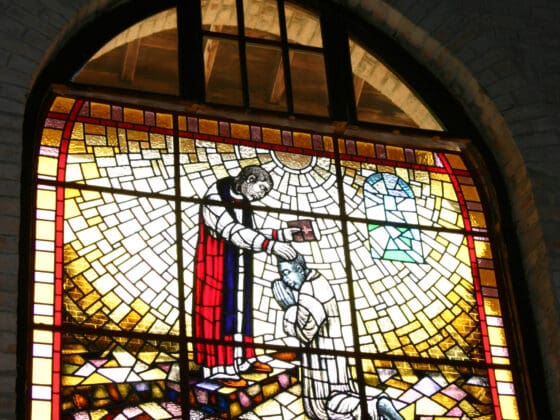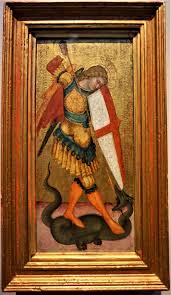A Sermon Preached at St. Thomas Anglican Church, Gibsonia, PA
August 3, 2025
Readings for Pentecost 8: Ecclesiastes 1:12-2:11; Colossians 3:5-17; Luke 12:13-21
And I will say to my soul, “Soul, you have ample goods laid up for many years; relax, eat, drink, be merry.”
But God said to him, ‘Fool! This night your soul is required of you, and the things you have prepared, whose will they be? (Luke 12:19-20)
What is a soul? No, not shoe leather, nor a fillet of… In the era of Artificial Intelligence, that is the question I’d like to address today. But first to our Gospel text.
Some of Jesus’ parables were provoked by an existential question, e.g. the Rich Young Ruler: “What must I do to inherit eternal life?” However, the voice from the crowd in our text today is more practical and demanding: “Teacher, tell my brother to divide the inheritance with me.” Jesus turns him away with “Man, who made me a judge or arbitrator over you?” In other words, get a lawyer, buddy!
But having been given an opening, Jesus turns to his disciples with a sermon on covetousness or more simply greed. The Greek word pleonexia indicates a pathology (like anorexia), in this case an addiction to “more and more.” The Book of Proverbs describes greed this way: “The leech has two daughters: ‘Give’ and ‘Give.’ Three things are never satisfied; four never say, ‘Enough’” (Prov. 30:15).
St. Paul puts it this way: “The love of money is the root of all evils” (1 Tim 6:10). Just as “the fatal glass of beer” is the beginning of an addiction to alcohol, so the love of money is the fatal temptation to worldly goods that leads the miser to pile money on money. This is the temptation that Jesus sensed in the man demanding an early payoff on his inheritance.
Greed, Jesus is saying, is a disease of the soul. But what is the soul? Consider the parable of the Prosperous Farmer.
Here is a man confronted with a practical problem: a superabundant harvest: “the rich man’s land produced plentifully.” It was the land, Jesus subtly suggests, not the man – good soil, good weather, good luck – that produced the surplus. The Farmer, however, does not see it that way: “‘What shall I do, for I have nowhere to store my crops?” He imagines himself not a steward but the creator of his harvest. His greed distorts his own self-image. I own it, I can do with it what I please!
With this mindset, he jumps to a decision: “I will do this: I will tear down my barns and build larger ones, and there I will store all my grain and my goods. And I will say to my soul, ‘Soul, you have ample goods laid up for many years; relax, eat, drink, be merry.’”
There is a hidden flaw in the farmer’s plan. He assumes that he has all the time in the world to execute his plan, that he cannot only control his crops but his lifespan. There is a delusion at the end of this rainbow: then I will be satisfied and can live it up. Then and only then can I satisfy my soul.
So what is the soul according to the Bible? Not surprisingly, we need to go back to the first chapters of Genesis to get clues: At the climax of the creation God says: “Let us make man in our image, after our likeness… So God created man in his own image, in the image of God he created him; male and female he created them. (Gen. 1:26-27). Human beings are rational, relational and communicative like God himself, who ponders before he acts. The soul is that Godlike image unique to our human kind.
The second chapter of Genesis continues: “the Lord God formed the man of dust from the ground and breathed into his nostrils the breath of life, and the man became a living creature” (Gen. 2:7). The human soul is symbolized as the breathing of the lungs and the beating of the heart, and it is embodied in the flesh, in the senses of sight, hearing, touch and taste; and since the Fall of Adam these senses have actually been working against the soul, as St. Paul says: “For I delight in the law of God in my inner being [my soul], but I see in my members another law waging war against the law of my mind and making me captive to the law of sin that dwells in my members” (Rom. 7:22-23).
When the Prosperous Farmer pondered his options, i.e., when he addresses his soul, we might even imagine him speaking the words of Solomon in our first lesson when he said: “And whatever my eyes desired I did not keep from them. I kept my heart from no pleasure, for my heart found pleasure in all my toil, and this was my reward for all my toil” (Eccl. 2:10). However, he fails to read the next verse, the Preacher’s sober conclusion: “Then I considered all that my hands had done and the toil I had expended in doing it, and behold, all was vanity and a striving after wind, and there was nothing to be gained under the sun” (verse 11). Natural man, the Preacher says, can seek fulfilment in worldly pleasures of food, sex, and rest, but it does not add up to happiness.
Man made in God’s image requires a dialogue partner. That partner can be another human being – a wife, a friend, a neighbor. The Farmer, it seems, had no such partner. In his miserly greed, he had made his money his companion. The final partner of the soul is God, as St. Augustine famously stated: “Lord, you have made us for yourself, and our heart is restless until it rests in you.” Sadly, the Farmer had neglected him also in his devotion to prosperity, but God had not neglected him. Too late, too late, he heard the Voice that said: “Fool! This night your soul is required of you, and the things you have prepared, whose will they be?”
Friends, the biblical truth about the soul has not changed one bit. It is a great delusion of our age to think that human beings can concoct the soul in a genetics lab or that “Artificial Intelligence” will ever be anything more than “artificial.” It is our calling as Christians to use the devices of modern technology so far as they are useful and beneficial but to call them out whenever they become idols as described by the Psalmist:
Their idols are silver and gold, the work of human hands. They have mouths, but do not speak; eyes, but do not see. They have ears, but do not hear; noses, but do not smell. They have hands, but do not feel; feet, but do not walk; and they do not make a sound in their throat. Those who make them become like them; so do all who trust in them. (Psalm 115:4-8)
I propose a simple test for AI, which I believe exposes its lack of soul. Ask it this: “Who am I?” or “Who are you?” and finally, “Who is God?” AI may toss back a cleverly worded wiki-answer in a beguiling voice of your choice, but the truth is, AI does not know what it is, or who you are, or who God is. It lacks a soul created in God’s image.
Now a final word about the life of the soul – a reality which the Prosperous Farmer and AI miss. The soul is made for love, for mutual love, God’s love, what Augustine was seeking. Love is what is commanded of God’s people in the Commandments: “You shall love the Lord your God with all your heart, with all your soul, and with all your mind; and you shall love your neighbor as yourself.”
In our epistle today, St. Paul explicitly links the sins of covetousness and idolatry (Col 3:5). Because the Farmer had neglected these commandments, he could not see that the harvest of the land was meant for thank-offerings to God and relief of the poor. He was, as our hymn today put it, “rich in things and poor in soul.”
God’s love, the Gospel tells us, came at a price: “He who did not spare his own Son but gave him up for us all, how will he not also with him graciously give us all things? (Rom 8:32); and again: “For God so loved the world, that he gave his only Son, that whoever believes in him should not perish but have eternal life” (John 3:16).
I close with the finest devotional poem ever written, titled “Love” by George Herbert, which takes the form of a dialogue between God and the soul.
Love bade me welcome: yet my soul drew back,
Guilty of dust and sin.
But quick-eyed Love, observing me grow slack
From my first entrance in,
Drew nearer to me, sweetly questioning
If I lacked anything.
“A guest,” I answered, “worthy to be here”:
Love said, “You shall be he.”
“I, the unkind, ungrateful? Ah, my dear,
I cannot look on thee.”
Love took my hand, and smiling did reply,
“Who made the eyes but I?”
“Truth, Lord; but I have marred them; let my shame
Go where it doth deserve.”
“And know you not,” says Love, “who bore the blame?”
“My dear, then I will serve.”
“You must sit down,” says Love, “and taste my meat.”
So I did sit and eat.
Brothers and sisters, we are now invited to the Lord’s table – body and soul – to receive his most precious Body and Blood. Let us do so with penitent and thankful hearts.





